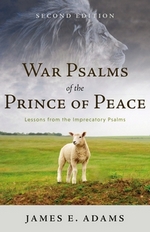 War Psalms of the Prince of Peace: Lessons from the Imprecatory Psalms, Second Edition
War Psalms of the Prince of Peace: Lessons from the Imprecatory Psalms, Second Edition
by James E. Adams
eARC, 176 pg.
P & R Publishing, 2016
Read: December 18, 2016

This is the 25th Anniversary Edition of the book — revised and expanded, no less. I was so glad to get the opportunity to read this one — I’ve got a copy of the original edition, which I’ve read 3 or 4 times, and referred to often. So to get to read a new edition — and to have an excuse to revisit the book — I had to jump at the chance.
Adams begins by reassuring Twentieth Century Christians (and I assume those of us in the Twenty-First Century, too) that the Imprecatory Psalms do belong in Scripture, are just as inspired as the rest, and have a place in the life and piety of his readers. Imprecatory Psalms, I should probably mention, are those Psalms that call for the destruction or judgment of the psalmist’s enemies. From there, Adams argues that no only do they belong in our Bibles, but (like the other Psalms) they belong in Christ’s mouth. To prove this, he compares the Imprecatory Psalms to the Psalms of Repentance — if Jesus Christ can say/sing the latter properly, then it’s fitting for him to sing/pray the former. I’m not positive that’s the best argument he could make, but I tell you, Adams makes it work (it helps that he spent far more space than I just did).
Given that they’re part of the Bible, and that if they’re fitting to be used by Christ, then they have a place in the life of the New Testament saint — but what is that place? How are we to use them? Do we get to call down the wrath of God on our enemies? (Short answer: NO).
This here is the heart of the book, and where Adams is at his best. Yes, we are to pray these prayers, sing these psalms —
You may say, “This is the last thing my church needs! If our hearts are too lazy and cold to pray for those we love, how can we think of praying for enemies, as we find in the Psalms?” But I would challenge you, isn’t this the cause of our lack of prayer? We have not learned from the Lord Jesus how to pray!
Learning to pray these psalms is a theme he returns to time and again —
Without assistance how can we ever righteously pray this prayer? I answer this question unequivocally: We never can! We cannot pray this prayer on our own . . . not because we are too good, but rather because we are too prone to evil! Yet we must learn to pray it.
But why are we to pray these prayers?
Why are we taught to pray for God’s judgment on the enemy? So that they will be converted! Nothing could be clearer from this prayer [Ps. 83].
That’s the core of the book, right there — I’ll let you read his explanation, but that’s the ballgame.
On the whole, I can’t tell you what was revised, nor can I say exactly how it was expanded — and there’s just no way I’m going to break out my original and read them in parallel to give you the list. What this primarily tells me is that what he did to improve the book came in fairly seamlessly. So I’m guessing that means we’re talking about minor tweaks and clarifications — no major new sections or anything. Would I have preferred a new chapter or two? Some more in-depth explorations of particular psalms? Yes. But the book didn’t need a new chapter or two, and it wasn’t intended to be that narrow in focus, so that kind of material would’ve felt out of place.
This is an easy read — clear, crisp writing that is deep enough to make you think, but written in a way that you don’t notice that you’re dealing with weighty theology. Adams writes with conviction, passion, and care – which is always helpful but particularly so with a topic like this. You don’t want a dry dissertation here, you need heart to go with the thinking. There’s a sensitivity here, which is needed, but more than anything a desire to treat the Bible (and the Spirit who inspired it) as it ought to be.
This is a gem — it was a gem 25 years ago when it was published, and it’s a gem today.
Disclaimer: I received this eARC from P & R Publishing via NetGalley in exchange for this post — thanks to both for this.
N.B.: As this was an ARC, any quotations above may be changed in the published work — I will endeavor to verify them as soon as possible.
—–


